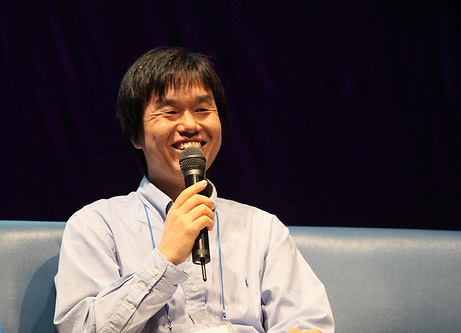Anyone who was in Korea as recent as two years ago would remember the mandatory requirement of having a Cyworld homepage, or minihompy. To those who may not be aware, this was the social networking service (SNS) that doubled as the Facebook and the Kakaotalk of its day during the 2000’s before it finally relented to its younger and sprightlier competitors as society shifted towards increased levels of smartphone ownership. Although Cyworld still exists, it is a shadow of its former self with its international branches in Europe, United States, Japan, and most of Asia defunct. Yet, it remains as a fascinating case of success as any other web-based product today – a dramatic example of how a website rode the wave of technological and societal change associated with the Internet. Therefore, on November 12, when Donghyung Lee, the co-founder of Cyworld, visited KAIST to give a talk on startups, interest was very high. The KAIST Herald went to investigate.

Can you briefly introduce yourself?
Hello, I am Donghyung Lee, currently the president of NowProfile Incorporated and co-founder of Cyworld. Actually, the idea of Cyworld was first hatched in August 1999 with the EC club, which took on online business transactions, that I was part of during grad school at KAIST. The club members collectively came up with the idea to create a social networking website for a research project. I took over the role of chief-executive officer from December 1999.
How did you get the idea to start your own company?
Before I attended KAIST College of Business, I worked at LG for seven years. The repetitive lifestyle of getting on the bus every morning and having my life regimented every day at work did not really suit my personality. I wanted the steering wheel, and I reckoned entrepreneurship was the key to doing so. Yet one thing about my work at an information and technology company was that I was first able to work with computers. My first contact with the Internet reminded me that sweeping societal changes were underway and that one could accommodate these trends for one’s social needs. This is how our idea for a web-based SNS first came into being, but we were not alone in the field - as seen by Sixdegrees.com in United States, MIXI in Japan, as well as Iloveschool, Freechal, and others in Korea.
So what set Cyworld apart from its competitors?
The first three years since our foundation can be described aptly as jumping headlong into the ocean. We expected near-instantaneous success, yet we had no idea that our expectations were entirely groundless. We courted potential investors and wrangled with competitors mostly in vain, until I realized we were approaching the problem the wrong way. In setting up an SNS, we were adding fancy new features and expecting customers to appreciate them regardless of their actual needs. Cyworld needed to be user-friendly; this was why we came up with the minihompy idea. Until now, people had trouble setting up personal web pages because the process was too complicated – this was especially true for the people who had most intimate social networks and who we wanted to integrate into our scheme: female university students. Now we had a simple and effective way of setting up personalized pages free of charge and available for everyone to visit. Afterwards, Cyworld usership really increased starting from 2003; by 2004, we were up to almost 25 million users.
So in your view, what is business?
Business should always be about providing services to people who need them. Most businesses never get off the ground precisely because they fail to adopt a customer-oriented viewpoint; their proposals are always about what features their product has, but never about addressing real-world problems faced by real people. Precisely as teachers should consider the needs of their students and as doctors should consider the needs of their patients, businesspeople have an obligation towards their target consumers and wider society.
Do you have anything to say to would-be entrepreneurs?
Entrepreneurship always has a certain air of romanticism about it. In reality, I can tell you that early startups always involve copious amounts of despair. Yet you must understand that the future is never certain. You never realize when that boiling point will come when your product takes off; in 2000, I expected to work a decade for success - instead I found that it was closer to four. People should never be afraid of trying something new. Even if your initial attempts fail, you will still have learned valuable lessons from it.
Geunhong Park Senior Staff Reporter
geunhongpiuspark@kaist.ac.kr

